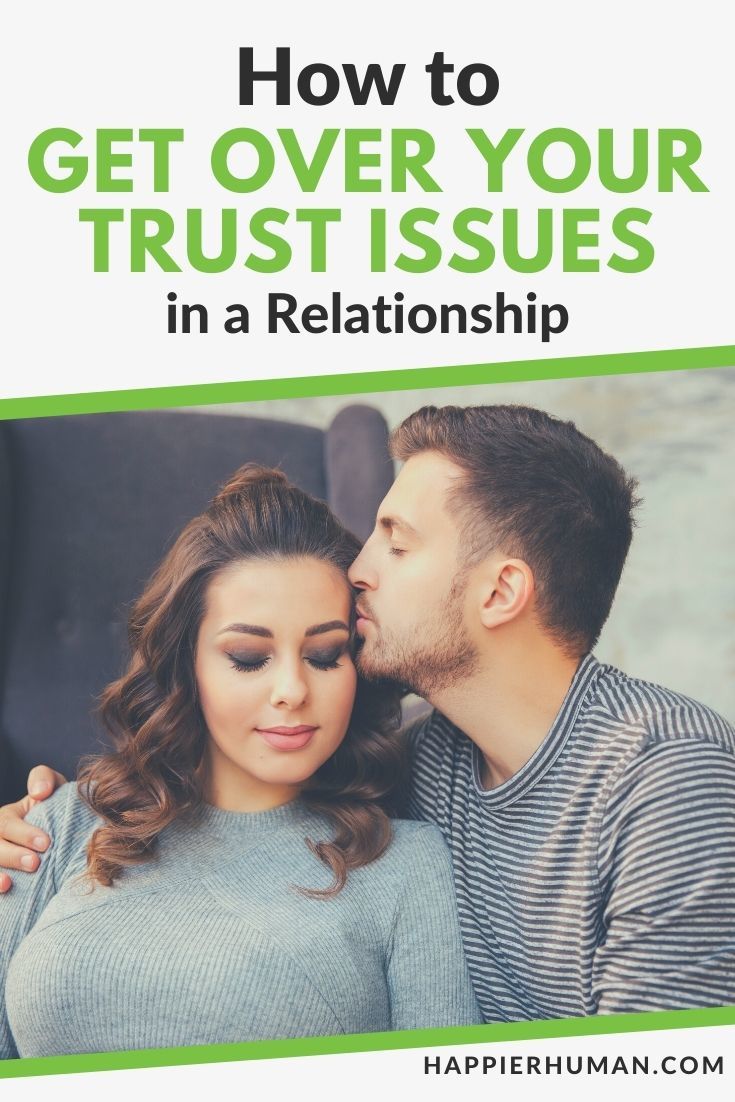Trust is one of the fundamental pillars of happy and healthy relationships.
Trust creates a sense of comfort that you share with your significant other and gives you the confidence to envision a future together.
Even though there’s no telling what the future holds, trust helps you find reasons to believe that what you two are sharing is stable, consistent, and lasing.
But trust doesn’t grow out of thin air, and it certainly doesn’t depend entirely on how much you love your partner.
It’s something you build over time, something that becomes stronger with each moment or experience in which both you and your partner show mutual trust.
It could be something as simple as letting your partner know where you are or when you will be getting home, not because they ask, but because you want to be open.
But trust can be fragile. Sometimes all it takes is one flirty text to ruin something you’ve built over the years.
In the absence of communication and openness, trust issues create a fertile ground for dishonesty, resentment, and uncertainty.
And that’s when doubt seeps in, slowly washing away all those plans in which your partner was right there next to you, celebrating victories and sharing burdens.
What Causes Trust Issues?
According to some experts, the fact that casual relationships are on the rise and we have tons of options in terms of dating has made trust a valuable (and scarce) resource. [1]
In other words, we rarely risk staying with someone unless we have enough guarantees that we won’t waste our time, energy, and emotions.
Anxious attachment
Attachment theory is a psychological model that partially explains the dynamics of human relationships. Attachment refers to a pattern of long-term relationships that a person establishes with another close person.
The way we cultivate emotional and romantic attachment depends significantly on how parents and caregivers interacted with us when we were children.
In essence, there are four attachment styles:
People with anxious attachment styles score high on anxiety and low on avoidance. They’re always afraid they’re going to lose the relationship, thus projecting insecurity. Furthermore, they tend to crave closeness and intimacy to the point where they risk driving the other person away.
One recent study revealed that distrust is a major risk factor that can trigger problematic behaviors (snooping through a partner’s belongings, jealousy) within the relationship for individuals with anxious attachment. [2]
Low self-esteem
In a nutshell, self-esteem is the opinion you have about yourself, the extent to which you love, appreciate and accept yourself with all the strengths, imperfections, and vulnerabilities that make up your identity.
Self-esteem drives self-confidence, a resource that allows you to pursue goals that generate happiness and fulfillment.

But when self-esteem dwindles, your personal, professional, social, and romantic life begins to take a turn for the worse.
Building a stable and lasting relationship can be extremely challenging when you believe you’re not good enough or don’t deserve to be loved and appreciated.
And that’s because when you feel insecure or self-conscious about different aspects of your identity, you will project these insecurities on your partner sooner or later.
Trauma
Trauma and abuse are some of the main reasons why we lose trust in ourselves and others.
But it’s not just victims of rape or assault that experience trust issues in relationships. Even war veterans and other groups susceptible to PTSD can have a hard time building trust with their significant other.
On the one hand, you desire intimacy, affection, and appreciation because that’s how humans are wired to function. No matter how much you deny or repress these fundamental emotional needs, they will always come back stronger.
On the other hand, your past tells you that people are not reliable, and if you put too much trust in them, you risk getting hurt.
As a result, you build barriers to keep people at a ‘safe’ distance until you can figure out if they are trustworthy.
But for the person who loves you and wants to be with you, this attitude can feel like rejection, which will either drive him/her away or create unbearable tensions.
To overcome your trust issues and achieve post-traumatic growth, you must find the courage to let your guard down once in a while and allow others to know you with all the emotional baggage you carry.
It’s the only way you’ll find someone who cares about you enough to share your burden and help you cultivate mutual trust.
Signs You’re Dealing with Trust Issues
When trust issues arise, you might be inclined to spend all your time wondering if the other person will be in your life for the foreseeable future.
Is he/she faithful to me?
Is he/she honest and open?
Will he/she stay if the going gets rough?
Whether we’re talking about a friendship, business partnership, or romantic relationship, lack of trust is a clear sign that things are taking a turn for the worse.
But the real problem occurs when you fail to exercise emotional maturity and communicate your concerns clearly.
You keep bringing up his/her ex.
We all have a past, and maybe some bits are best left behind.
Repeated and seemingly endless discussions about your partner’s past relationships signal insecurity and distrust.
Not only that you might not get anything useful out of them, but you also risk hurting your significant other by projecting your insecurities onto him/her.
It’s ok to talk about your partner’s ex, but only if he/she brings it up.
You check his/her phone.
When you have doubts about your partner, the first thing that usually comes to mind is to check his/her phone.
You check his/her messages and go through his/her browsing history, hoping to find some “evidence” that would confirm your suspicions.
Unfortunately, this invasion of privacy will create distance and dishonesty in your relationship.
You make mountains out of molehills.
If you’re insecure about certain aspects of your life, you may be inclined to blame your partner instead of making an effort to overcome them.
Sometimes, even a small gesture like your partner laughing at someone’s joke might be enough to trigger a fight.
Even though it’s perfectly ok to discuss and clarify the little things that might have bothered you, it’s essential to maintain a balanced and rational perspective.
You deny his/her personal space.
Whether we’re single or in a relationship, we all need personal space.
Your personal space is where you can take a break from everyone and everything and connect with yourself at a profound level.

When you deny your partner this vital space, you risk driving him/her away.
Nobody wants to be with someone so insecure and suspicious that he refuses to accept his partner’s need for personal space.
You rely on him/her to make all the decisions.
This attitude usually results from a lack of self-confidence, which, as we discussed earlier, creates a fertile ground for trust issues in relationships.
A relationship is like a team where both ‘players’ put in the effort, take risks, and share victories.
Long story short, avoid altering the balance of your relationship by projecting unrealistic expectations and placing all the responsibility on your partner’s shoulders.
Otherwise, you risk turning a healthy relationship into a codependent one.
You always feel like he/she’s hiding something from you.
Once again, it’s not about your significant other; it’s about you.
Every time you give in to this feeling, you show your partner that you don’t trust him/her.
Since you are the one feeling insecure, perhaps you should explore this feeling and see where it comes from.
In my experience, it usually comes from past relationships where you put your trust in someone and ended up being disappointed.
You get upset every time he/she wants to hang out with friends (without you).
What’s the worst thing that could happen if you let your partner hang out with his/her friends? Meet someone new and fall in love?
I’m sorry to tell you, but this can happen anywhere, at the supermarket, at the office.
No matter how much you love and appreciate each other, you will never have full control over what might happen in the future.
Being restrictive and denying his/her individuality will not keep him/her close to you forever.
How to Deal with Trust Issues in a Relationship
Part of cultivating trust in a relationship is the courage to trust yourself and your instincts.
If you’ve found someone you love and want to make your relationship work, it’s vital to take a leap of faith and allow your significant other to prove himself/herself trustworthy.
Rather than feeling insecure and imagining a million ways in which your relationship could turn sour, trust that you know what you’re doing and that, one way or another, you will find the strength and wisdom to solve any situation that might arise.
1. Trust starts with open communication.
Although it might not be easy, start an open discussion with your partner and clarify the issues and events that have sparked trust issues.
This is the perfect moment to understand the difference between a situation where your partner gave you a reason to be suspicious and a situation in which you reacted out of fear and negative anticipation.
It’s also an excellent opportunity to discuss previous relationships and figure out if you or your partner have come across trust issues before.
Another critical aspect that you can discuss is your emotional needs. In other words, let your significant other know what’s important to you and pay close attention to his/her needs.
In fact, why not put each other’s needs in writing and identify concrete ways to fulfill them.
Lastly, commit to honoring each other’s needs as much as possible, as long as they do not contradict your values and beliefs.
2. Trust requires honesty.
As I said in the beginning, trust is something you build over time.
If you present yourself as trustworthy, it’s essential to back this image up with clear actions and gestures.
All the stories you share with your significant other will create an image that will crumble and fall sooner or later if it's built on lies.
In general, when mistrust creeps into your relationship, even the truths become hard to believe simply because you’ve lost credibility.
And I’m not saying your relationship is doomed to fail.

All I’m saying is that trust is hard to build and easy to lose.
So be honest with your significant other if you wish to have a happy and fulfilling relationship.
When you express your opinion about him/her, be honest and say what needs to be said even if it’s not what he/she would like to hear.
The truth may be hard to digest, but it’s a guaranteed way to cultivate trust.
3. Trust flourishes out of vulnerability.
In essence, being vulnerable means taking emotional risks and exposing yourself to uncertainty.
Having the courage to let your guard down in front of someone and expose your weak spots is a sign of emotional independence and maturity.
From saying “I love you” without knowing if the other person will say it back to asking for help when you feel weak and powerless, there are numerous ways in which you can exercise vulnerability.
But no matter how uncomfortable it may feel to stand ‘naked’ and imperfect in front of another person, always remember that vulnerability is a fertile ground for trust.
It is the purest and most authentic gesture you can do to show your partner that you trust him/her enough to be the real you.
Not only that your vulnerability builds trust, but it can also inspire your significant other to do the same.
And when that happens, be ready to receive it with empathy and appreciation.
4. Trust requires you to “put your money where your mouth is.”
Words that are not backed by actions are nothing more than empty promises.
Would you trust a person who keeps saying that they’re going to do something, only to come up with a lousy excuse to justify why they didn’t do it?
Of course not!
Unfortunately, there are times when you might be tempted to make unrealistic promises because you want to show your significant other how much you value their presence in your life and that you wish to invest in your union.
But even though your promises might come from a good place, in the end, all that matters is whether that promise comes true or not.
And don’t fool yourself thinking that you can fix it with an “I’m sorry. It won’t happen again.” Words don’t fix broken promises; actions do.
If you want to establish yourself as a trustworthy partner, do what you say you’re going to do and never make promises you can’t keep.
This rule applies to all types of relationships, be it friendships, romantic relationships, or business partnerships.
Final Thoughts on Trust Issues in a Relationship
Every relationship is founded on a series of common interests, needs, values, and beliefs that create trust and understanding between partners.
In general, these components are somewhat implied and unconscious, especially at the beginning of the relationship. There are times when even people who share different beliefs and values can find a way to function as a couple.
Trust, however, is the fundamental ingredient of any healthy and lasting relationship. And when this ingredient is missing (or loses its potency), sooner or later, the relationship will take a turn for the worse.
Whenever trust issues arise, they bring strong emotions such as fear, sadness, disappointment, disgust, and anger towards the other person or even towards ourselves.
As expected, these feelings can cloud our judgment and prevent us from correctly assessing the situations that can generate trust issues in a relationship.
Whenever you find yourself in this position, make sure to:
No contract, whether written or spoken, will hold two people together.
Only trust, honesty, and good communication.
And if you're looking for more resources on relationships, be sure to check out these blog posts:
- Relationship OCD: Symptoms, Causes, and How to Treat
- 9 Steps to Get Over Abandonment Issues in a Relationship
- 5 Strategies to Cope with New Relationship Anxiety

Alexander Draghici is a licensed Clinical Psychologist, CBT practitioner, and content writer for various mental health websites. His work focuses mainly on strategies designed to help people manage and prevent two of the most common emotional problems – anxiety and depression.

References
[1] A. van der Rijt and V. Buskens, “Trust in Intimate Relationships The Increased Importance of Embeddedness for Marriage in the United States,” Rationality and Society, vol. 18, no. 2, 2006.
[2] L. M. Rodriguez, A. M. DiBello, C. S. Øverup and C. Neighbors, “The Price of Distrust: Trust, Anxious Attachment, Jealousy, and Partner Abuse,” Partner Abuse, vol. 6, no. 3, p. 298–319, 2015.

